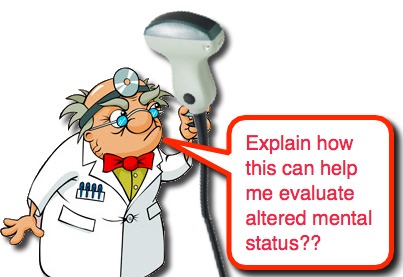Intussusception & Altered Mental Status
Evaluating the child with altered mental status can be very challenging. As with adults, there are a myriad of potential etiologies and it can be difficult to prioritize the order of the evaluation. Does this patient have an intracranial process or maybe just simple hypogylcemia? Or maybe we need to consider serious bacterial infections and intoxicants instead?
Many of you will recall the mnemonic “TIPS AEIOU” [Trauma, Infection, Psych, Space Occupying Lesion, Alcohol, Electrolytes, Insulin, Opiates, Uremia] to help consider a number of the potential etiologies of altered mental status. I use this often, but it is important to remember that along with “infection” and “insulin” the “I’s” also stand for “Intussusception.”
Intussusception Basics
- Occurs when one segment of bowel telescopes into the adjacent segment.
- Second most common abdominal emergency (appendicitis is #1).
- Most often this occurs near the ileocecal valve.
- Most are idiopathic.
- ~5% are associated with lead points or disease
- Lead Points examples = hypertrophied peyer’s patches, Meckel’s Diverticulum, ectopic pancreas, post-operative complications
- Disease examples = Henoch-Schonlein Purpura, Leukemia, Cystic Fibrosis.
Intussusception Presentation
- “Classic” presentation (Abdominal Pain, Currant Jelly Stools, and vomiting) is only seen in 20%- 33% of cases.
- 75% without obviously bloody stools will have positive occult blood.
- Great reason to check heme occult for the vomiting child without diarrhea.
- Abdominal Mass is commonly found (when looked for).
- Fever, anorexia, diarrhea, and dehydration can be seen and can lead to misdiagnosis.
- Many cases are missed upon initial evaluation — we must always remain vigilant!
Intussusception and Altered Mental Status
- Along with the classic and common presentations, patients with intussusception may also present with altered mental status.
- This altered mental status is often thought of as the child being inconsolable.
- Most practitioners will have intussusception high on the DDx in the child with inconsolability and vomiting.
- Additionally, significant somnolence and lethargy can be seen with intussusception!
- Numerous cases have been reported that highlight this fact.
- Cause of the lethargy is unclear.
- Presence of lethargy does not, necessarily, portend a worse outcome (but does contribute to delayed diagnosis, which can lead to more morbidity/mortality).
- Cases of intussusception and altered mental status often also have history of:
- Vomiting,
- Heme-positive stool,
- Abdominal Pain,
- or Abdominal Mass
POCUS and Altered Mental Status
- So how can Point of Care Ultrasound (POCUS) help with the evaluation of altered mental status in a child?
- POCUS can be used to AUGMENT the physical exam.
- Studies have shown the POCUS can be used by emergency practitioners (in a variety of locales) to rule-in the diagnosis of intussusception.
- The evaluation should not (yet) be used to rule-out the diagnosis; however, it’s utility can help prioritize the next most appropriate step.
- For instance, consider the 18 month old presenting with lethargy and episodes of non-bilious emesis. You perform POCUS:
- If consistent with intussusception, then call your surgeon and your radiologist.
- If not consistent with intussusception, it may still be present, but you may want to get that Head CT and give antibiotics before getting abdominal imaging.
- For instance, consider the 18 month old presenting with lethargy and episodes of non-bilious emesis. You perform POCUS:
Moral of the Morsel
Altered Mental Status? Augment your exam with POCUS. It may be intussusception.



[…] of the evaluation and management of intussusception (ex, Intussusception, Intussusception and HSP, Change in Mental Status, and Disposition). Obviously, the use of ultrasound has dramatically improved our ability to […]
[…] More: Intussusception & Altered Mental Status (PED EM […]